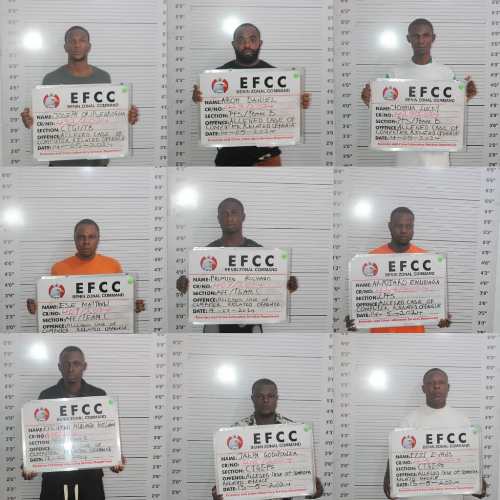In the past few months, there seems to be a relentless battle against cybercrime by the Benin Zonal Directorate of the Economic and Financial Crimes Commission (EFCC) with the securing of no fewer than 30 convictions of different individuals involved in cybercrime.
On the 17th of October, The Trumpet reported the conviction of 15 internet fraudsters by EFCC. The convicts, including Nosa Gift, Igbinosa Eghosa, and Nosakhare Godswill, were sentenced by Justice A. N. Erhabor of the Edo State High Court, sitting in Benin City, after pleading guilty to charges of fraud, impersonation, and retention of proceeds from crime.
The fraudsters faced separate charges, including obtaining by false pretence and possession of fraudulent documents. One of the charges against Gift stated that he was found in possession of documents containing false pretences, in violation of the Advance Fee Fraud and Other Fraud Related Offences Act of 2006.
Upon their guilty pleas, the EFCC prosecutors, led by I.M. Elodi and A.A. Ibrahim Faisal, urged the court to deliver swift justice, while the defence counsel pleaded for leniency, claiming the defendants had shown remorse.
Justice Erhabor sentenced 14 of the convicts to two years imprisonment with the option of a N200,000 fine, while Ugiagbe Miracle received a three-year sentence with the same fine option. In addition, all 15 were ordered to forfeit their ill-gotten devices, including phones, laptops, and money traced to their bank accounts, to the federal government.
Just a week after handing down sentences on 15 internet fraudsters, Justice A.N. Erhabor of the Edo State High Court in Benin City once again delivered judgments on another group of eight(8) fraudsters involved in cybercrime.
The commission disclosed this milestone on its official X Social media handle on Tuesday, 22nd October 2024.
The convicts, identified as Akhigbe Andrew Okhaifoh, Collins Osagie, Wisdom Imaduerehie, Imade Destiny, Chibueze Onyeji, Edubi Favour, David Precious, and Michael Osas Iguma, were each charged by the Economic and Financial Crimes Commission (EFCC) on various counts of fraud.
The charges included impersonation, obtaining money under false pretences, retaining proceeds from criminal activities, and possessing fraudulent documents.
The prosecution, led by EFCC counsel I.M Elodi, K.Y. Bello, Isa K. Agwai, A.A. Ibrahim Faisal, A.S. Bala-Ribah, and Ahmed Salihu, filed separate one-count charges against the fraudsters. One of the charges, against Collins Osagie, stated: “That you, Collins Osagie, on or about the 30th of September, 2024, within the jurisdiction of this honourable court, did have in your possession documents which you knew or ought to have known contained false pretences, thereby committing an offence contrary to Sections 6 and 8(b) of the Advance Fee Fraud and Other Fraud Related Offences Act 2006, and punishable under Section 1(3) of the same Act.”
Similarly, The Trumpet reported on the 9th of November the conviction of yet another seven(7) internet fraudsters. This recent legal action underscores the persistent challenge of cybercrime in Nigeria, particularly in Benin City, which has become notorious for such activities.
The convicted individuals faced Justice A.N. Erhabor of the Edo State High Court, where they were sentenced between November 6 and 7, 2024. The charges ranged from identity theft, and business email compromise, to romance scams, reflecting the diverse methods employed by these cybercriminals to defraud unsuspecting victims globally.
Cybercrime, especially by groups like the Yahoo Boys, has been a thorn in the side of Nigerian society for years. These fraudsters, often young and tech-savvy, exploit digital platforms to orchestrate scams that have financial and reputational repercussions not just in Nigeria but internationally. Despite numerous arrests and convictions, the phenomenon shows no signs of abating, fueled by factors like high unemployment, poverty, and a desire for quick wealth among the youth.
Read also: House committee scores EFCC high on anti-corruption efforts, budget performance
The EFCC’s efforts have been commendable, with operations leading to significant arrests across the country. However, the cycle of conviction seems unending. Recent posts on X (formerly Twitter) by various users and news outlets indicate ongoing arrests and court proceedings, suggesting that while enforcement is active, the root causes of cybercrime are not being adequately addressed.
The socio-economic impact of these crimes is profound. Victims, often from abroad, lose substantial amounts of money, which in turn affects Nigeria’s international image. Domestically, the lavish lifestyles funded by cybercrime can skew perceptions of success among the youth, making the digital underworld seem like a viable career path. This has led to a situation where cybercrime has become somewhat normalized within certain communities, especially in hotspots like Benin City.
Adding to the complexity, there’s the emergence of “Yahoo Plus,” where cybercrime is mixed with spiritual practices believed to enhance the success of fraudulent schemes. This blend of technology and traditional beliefs illustrates the deep cultural and economic issues at play, where crime is not just about technology but also about cultural identity and survival.
While the EFCC continues to clamp down on internet fraudsters, experts suggest that long-term solutions might require more than just legal enforcement. Educational and economic reforms aimed at providing viable alternatives for youth could mitigate the allure of quick, illicit gains. Moreover, international cooperation, improved cybersecurity infrastructure, and public awareness campaigns are crucial in curbing this digital plague.
As the wave of convictions of more Yahoo Boys in Benin City continues, it might seem like a victory in the fight against cybercrime, but it also highlights the ongoing challenge of an underlying ailment of decay in society. While agencies like the EFCC work to dismantle these networks, the broader socio-economic issues fueling cybercrime remain, suggesting that without comprehensive strategies, the docks of Benin City will continue to see an unending parade of cyber criminals.






